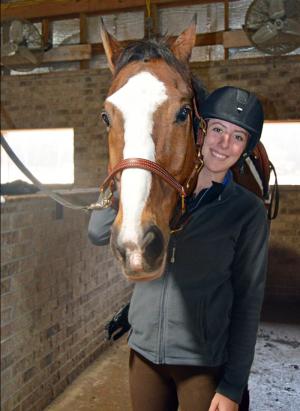By Tommy Brannon
The University of Memphis Equestrian Team is headed for their first competition of the season in February, 2019 in Murfreesboro. Tenn. This will also be the first intercollegiate competition for many of the team members. The team will be competing against teams from Middle Tennessee State, University of Tennessee Knoxville, Murray State University, Rhodes College, University of the South at Sewanee, and Arkansas State.
The University of Memphis has a long history of intercollegiate equestrian sports going back to the 1980s and 90s with the then Memphis State Tiger Riders. That team has produced several graduates who went on to become equine professionals in the mid-south area.
The U of M team has members who compete and some who do not. Any U of M student interested in horses can be part of the Equestrian Club. The competitive members in Hunt Seat are: the team President Samantha Davis (sophomore) Chloe Kjellin (sophomore) Elena Scott (freshman) Mary Grayson-Fauser (freshman), Chandler Head (freshman), and Mick McCarty (Junior). Some are quite new to riding and others, like Chandler Head, have been riding most of their lives. Samantha Davis took up riding a few years ago and competed on the Mississippi State team a few semesters ago before transferring back to the Memphis.
They work with coach Poppy Doyle, who has hosted the team for three years at Trinity Farm in Lakeland, Tenn., where the club meets once a month. They also have non-riding meetings on campus. In addition to coaching the club, Poppy teaches the U of M Equine Physical Education class, which is an elective PE class for college credit and meets once a week. Poppy said, “The PE class feeds the club a little bit, as many of the riders on the team started with the PE class.” Some of the riders board their horses at Trinity, while some use other trainers and board at other barns in the Memphis area.
Poppy said that, as the University of Memphis is an urban school without an agricultural college, the team has to raise their own money to go to competitions. They do this by soliciting sponsors and selling T- shirts.
Poppy tries to add some consistency in the team, and Trinity Farm is a good home base for the club. She encourages the club members to do other [than intercollegiate] horse shows at various levels. She also wants the club to do more than just hunter jumpers. “I want it to be about a little of everything, including dressage, fox hunting, and other types of riding.” She added, “Riders in the club have varying levels of experience both riding and showing. They may be experienced riders, but if they have not shown, they start at the bottom [in intercollegiate competitions]. They have to have at least six months of consistent training. If they have not ridden before, they have to ride for six months before they can show. I like for them to go at least once to a show without riding before they compete.”
The scheduled intercollegiate horse shows have classes covering different riding skills – from walk/trot on the flat to jumping. At intercollegiate competitions, riders do not ride their own horses. The host school provides a pool of horses and each rider draws a horse. The rider does not even warm up the horse. Someone else does that and hands the horse to the rider as they are about to enter the arena. The horses are also at various levels of training and skill. This really brings out the versatility and skill level of each rider!
When coaching, Poppy likes to work with most of the team in her arena at one time in a group lesson. After riding one horse, they will play “ring around the horses” and all swap mounts multiple times. Poppy said, “This is a good way for each rider to adjust to different horses.” She also likes to let them draw a horse when they ride at one of Trinity Farm’s shows. She said that the horses will change throughout the day of a show. The horse you rode at 8:00 in the morning will be different at 4:00 in the afternoon. She added, “Some of the experienced show riders do not necessarily get excited about intercollegiate shows, but it is different from what they do at home. It is competition with a team. They travel together and hang out together. Those that have traveled together tend to bond a little quicker. They are a great group of kids!”
Find more information about Trinity Farms and the University of Memphis Equestrian Team at these websites: trinityfarmtn.com/collegiate-equestrian-programs/ and https://memphis.campuslabs.com/engage/organization/horses.
The U of M Equestrian team is on facebook at: Equestrian Club at the University of Memphis and Trinity Farm is on facebook at: Trinity Farm.
The University of Memphis Equestrian Team is headed for their first competition of the season in February, 2019 in Murfreesboro. Tenn. This will also be the first intercollegiate competition for many of the team members. The team will be competing against teams from Middle Tennessee State, University of Tennessee Knoxville, Murray State University, Rhodes College, University of the South at Sewanee, and Arkansas State.
The University of Memphis has a long history of intercollegiate equestrian sports going back to the 1980s and 90s with the then Memphis State Tiger Riders. That team has produced several graduates who went on to become equine professionals in the mid-south area.
The U of M team has members who compete and some who do not. Any U of M student interested in horses can be part of the Equestrian Club. The competitive members in Hunt Seat are: the team President Samantha Davis (sophomore) Chloe Kjellin (sophomore) Elena Scott (freshman) Mary Grayson-Fauser (freshman), Chandler Head (freshman), and Mick McCarty (Junior). Some are quite new to riding and others, like Chandler Head, have been riding most of their lives. Samantha Davis took up riding a few years ago and competed on the Mississippi State team a few semesters ago before transferring back to the Memphis.
They work with coach Poppy Doyle, who has hosted the team for three years at Trinity Farm in Lakeland, Tenn., where the club meets once a month. They also have non-riding meetings on campus. In addition to coaching the club, Poppy teaches the U of M Equine Physical Education class, which is an elective PE class for college credit and meets once a week. Poppy said, “The PE class feeds the club a little bit, as many of the riders on the team started with the PE class.” Some of the riders board their horses at Trinity, while some use other trainers and board at other barns in the Memphis area.
Poppy said that, as the University of Memphis is an urban school without an agricultural college, the team has to raise their own money to go to competitions. They do this by soliciting sponsors and selling T- shirts.
Poppy tries to add some consistency in the team, and Trinity Farm is a good home base for the club. She encourages the club members to do other [than intercollegiate] horse shows at various levels. She also wants the club to do more than just hunter jumpers. “I want it to be about a little of everything, including dressage, fox hunting, and other types of riding.” She added, “Riders in the club have varying levels of experience both riding and showing. They may be experienced riders, but if they have not shown, they start at the bottom [in intercollegiate competitions]. They have to have at least six months of consistent training. If they have not ridden before, they have to ride for six months before they can show. I like for them to go at least once to a show without riding before they compete.”
The scheduled intercollegiate horse shows have classes covering different riding skills – from walk/trot on the flat to jumping. At intercollegiate competitions, riders do not ride their own horses. The host school provides a pool of horses and each rider draws a horse. The rider does not even warm up the horse. Someone else does that and hands the horse to the rider as they are about to enter the arena. The horses are also at various levels of training and skill. This really brings out the versatility and skill level of each rider!
When coaching, Poppy likes to work with most of the team in her arena at one time in a group lesson. After riding one horse, they will play “ring around the horses” and all swap mounts multiple times. Poppy said, “This is a good way for each rider to adjust to different horses.” She also likes to let them draw a horse when they ride at one of Trinity Farm’s shows. She said that the horses will change throughout the day of a show. The horse you rode at 8:00 in the morning will be different at 4:00 in the afternoon. She added, “Some of the experienced show riders do not necessarily get excited about intercollegiate shows, but it is different from what they do at home. It is competition with a team. They travel together and hang out together. Those that have traveled together tend to bond a little quicker. They are a great group of kids!”
Find more information about Trinity Farms and the University of Memphis Equestrian Team at these websites: trinityfarmtn.com/collegiate-equestrian-programs/ and https://memphis.campuslabs.com/engage/organization/horses.
The U of M Equestrian team is on facebook at: Equestrian Club at the University of Memphis and Trinity Farm is on facebook at: Trinity Farm.







